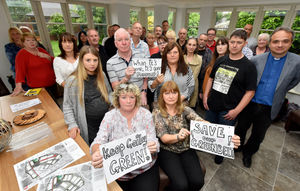Campaigners' hopes ended as council decides against West Midlands Interchange challenge
Councillors in South Staffordshire have decided against launching a legal challenge to a huge rail depot - dashing any lingering hopes of the scheme being blocked.
The West Midlands Interchange now looks certain to go ahead on land the size of 430 football pitches at Gailey after South Staffordshire Council concluded there was no basis for a legal challenge.
A judicial review was the final card held by campaigners who have battled for four years to try and stop the Interchange from being built.
Leaders of the Stop the West Midlands Interchange group have already confirmed they cannot afford to lodge a legal challenge on their own.
In any event, for a review to be successful it would have to be proved a substantial error was made by the Government in approving the development.
Timeline of coverage:
April 2016: 8,500 jobs promised as plans unveiled
April 2016: A boost for the region or a grave concern?
July 2016: MPs unite to fight 'disastrous' rail hub
August 2016: Expert gives damning view on £8 million rail hub
September 2018: Gavin Williamson steps up fight against Interchange
December 2019: Planning experts make recommendation to Government
February 2020: Residents in limbo as decision date looms
March 2020: Campaigners in the dark on Interchange decision
Officials in Staffordshire have vowed to do all they can to limit the impact of the rail depot, which will be built next to the M6, and create up to 8,500 jobs.
The site was chosen by developer Four Ashes Ltd due to its close proximity to the West Coast Mainline and motorway. Locals say the scheme will destroy the green belt and cause traffic chaos.

Councillor Roger Lees, deputy leader and head of planning at South Staffordshire Council, said: “Following the announcement of the order, the council, having taken advice, are of the view that there is no legal basis to challenge the decision.
"While the council was opposed to the scheme, we will now work to ensure that the maximum benefits of the West Midlands Interchange can be witnessed and any impacts mitigated for our communities.”
Donna Gilmartin, who heads the protest group, says members have been assured they will be given seats on a development steering group, to ensure residents get the best deal possible.
She said last month: “There’s nothing our group can do now. It would cost £50,000 to get a judicial review going and we would have to find that money. We knew pretty much straight away we wouldn’t be able to fund that.”





